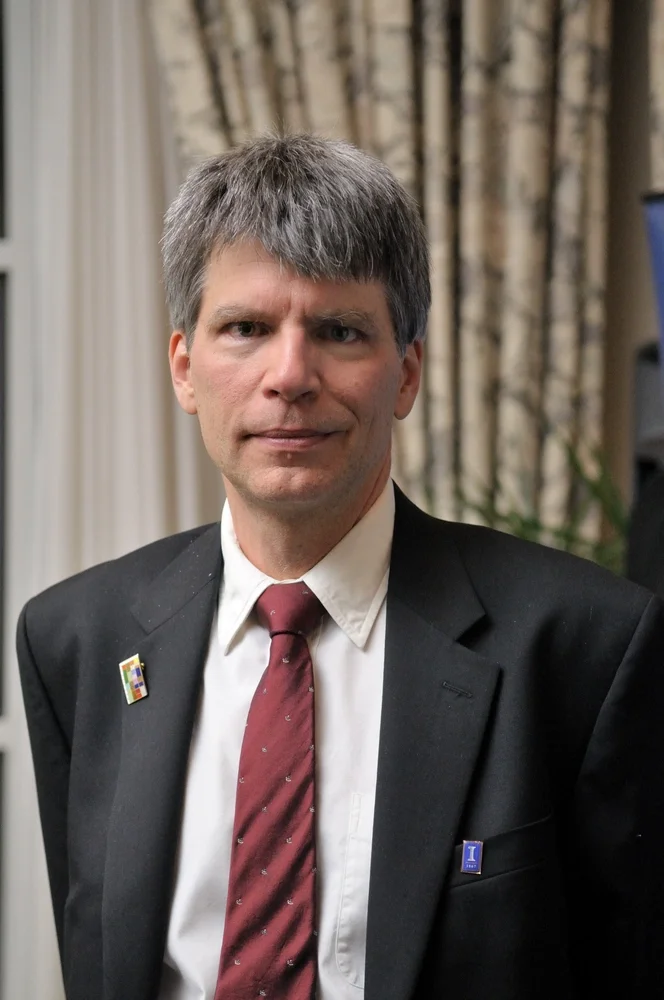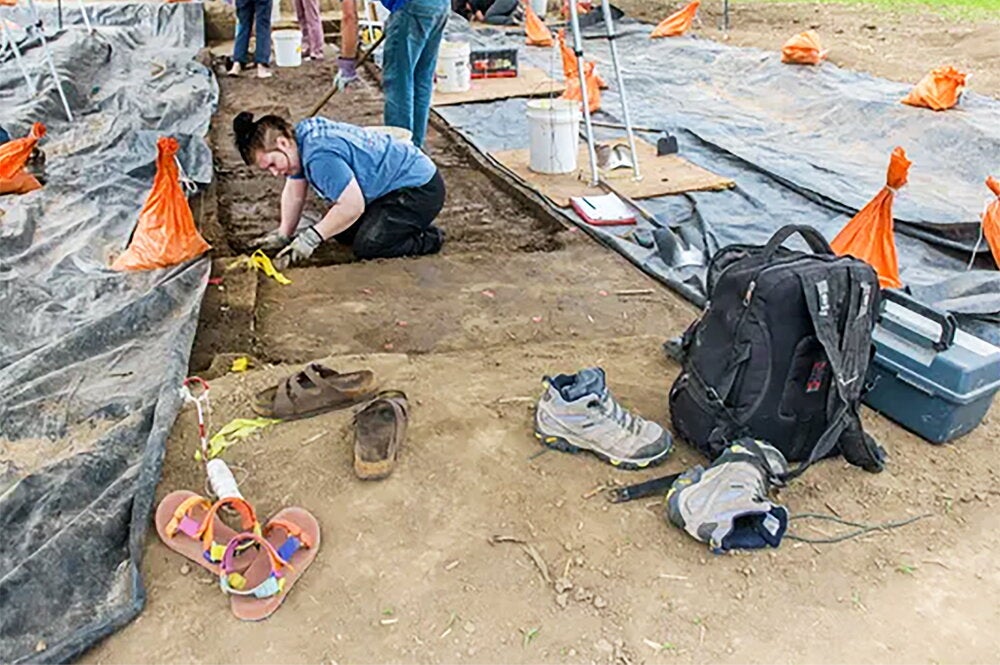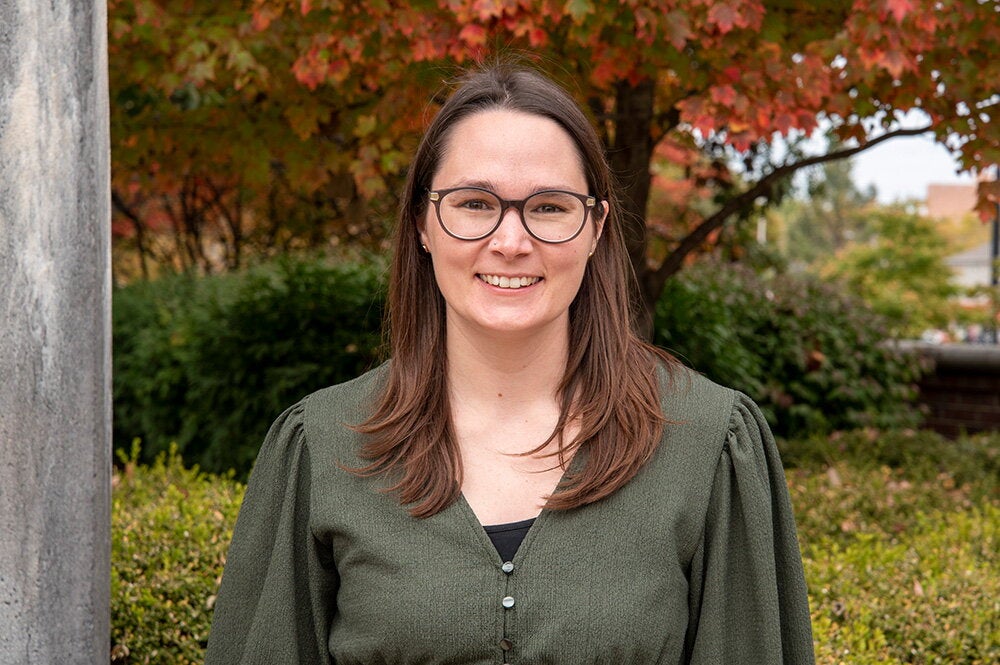
Richard Powers (AB, '78; MA, '80, English) nearly drove off the road, he was so taken aback. As he sped through the flatlands of Nebraska along Interstate 80, he thought at first that he was hallucinating. But what he was seeing turned out to be thousands of sandhill cranes, three feet tall, lifting up into the air and spreading out in all directions.
“The sight was absolutely thrilling, partly because I didn’t know what I was looking at and partly because the gathering was just so primordial,” said Powers, an LAS alumnus and Illinois professor, in an interview with The Believer.
Powers discovered that about 80 percent of every migratory crane in North America—almost a half million birds—came to this same spot in March every year. The stunning sight also triggered an idea for Powers’ next novel at the time—The Echo Maker, a story that uses cranes as a metaphor for estrangement. The Echo Maker focuses on a character who has a car accident that leaves him suffering from Capgras syndrome, in which sufferers fail to recognize only the people closest to them—an “estrangement from our own subcortical selves,” says Powers, winner of the 2010 LAS Alumni Achievement Award.
The Echo Maker went on to win the National Book Award in 2006, one in a long line of accolades that Powers has received over the years, establishing him as one of the leading novelists in the nation. Even more recently, he was elected to the American Academy of Arts and Letters—the highest honor for a U.S. artist. He has also received a MacArthur “genius” fellowship, a Lannan Literary Award, and the James Fenimore Cooper Prize for Best Historical Fiction, among others.
“As a writer, Powers is still comparatively young—and most people who pay serious attention to American fiction would count him as one of the few truly important authors we have the privilege of keeping company with today,” says English professor Bruce Michelson.
Powers grew up Lincolnwood, a suburb of Chicago, although his family moved to Bangkok when he was 11, so he spent his formative teenage years in Southeast Asia. But Powers didn’t set his sights on writing until much later. In fact, he says that his math and science skills were always much sharper than his verbal skills, so he always assumed he would do something in science. At one time, it was oceanography, then paleontology, then physics....
Powers came to Illinois as a physics major, but he switched to English literature because the increasing specialization in the sciences left him feeling cut off from other disciplines that he loved. He had too many varied interests to specialize, so he looked for a field where he could “preserve that sense of multiplicity, of generalism.”
Even after receiving his master’s degree in literature from Illinois in 1980, Powers didn’t immediately set his sights on writing novels. He moved to Boston, where he became a computer programmer, putting to use the fascination with computers that he had cultivated on U of I’s PLATO system.
It would be an overstatement to say that Powers stumbled onto writing novels by accident, but there was certainly an element of chance when he wandered into Boston’s Museum of Fine Arts and came across a 1914 black-and-white photograph of three farm boys heading to a dance. The image triggered an idea, and Powers decided within 48 hours to quit his job and write his first novel.
The result was Three Farmers on Their Way to a Dance, published in 1985 to great acclaim. In all, he has published 10 novels and has been a finalist for the Pulitzer Prize, a finalist for the National Book Award prior to his 2006 win, and a four-time finalist for the National Book Critics Circle Award.
In the wake of his first book’s success, Powers moved to Holland to continue writing without the distractions surrounding him in the United States. But in 1992, just like the cranes returning to Nebraska each year, he came back to the Midwest and the U of I. Since then, he has been a professor and writer-in-residence at Illinois.
Instead of living the life of a literary recluse, Michelson says that Powers gives generously to students and fellow faculty, sometimes conversing “late into the evening with small groups of undergraduate students, as freely and eagerly as he interacts with famed interviewers.”
“His generosity to colleagues and students in English is truly legendary,” adds Curtis Perry, head of the English department.
One of Powers’ books, Galatea 2.2, takes place on a university campus, a thinly disguised version of the University of Illinois. The main character works in a research center that bears striking similarities to the Beckman Institute at Illinois, where Powers has an office. Galatea 2.2 is a science-laden take on the Pygmalion story, in which a team of cognitive scientists tries to teach a computer to take on the human ability of interpreting literature.
Powers, whose work is often described with words like “cerebral” or “brainy,” weaves together many strands of science, such as genetics, computer science, medicine, ornithology, neurology, and more. As a novelist, Powers finally found the “sense of multiplicity, of generalism,” that he had always sought.
Technology is often at the core of his novels, which is only appropriate for a former computer programmer who used to spend his weekend nights “looking under the hood” of computers, rather than going to movies. He even wrote The Echo Maker using voice recognition software on a PC tablet.
But behind the technology are complex characters and ideas. Powers maintains that there is a false dichotomy when people assume books are either about ideas or characters. They can be about both, he says.
“My entire writing life, I’ve wanted to suggest that all novels are to some degree both and that some novels try to erase that artificial boundary in order to show the links between thinking and feeling,” he told The Believer. “The need for knowledge is as passionate as any other human obsession.... Voiced idea is character.”


